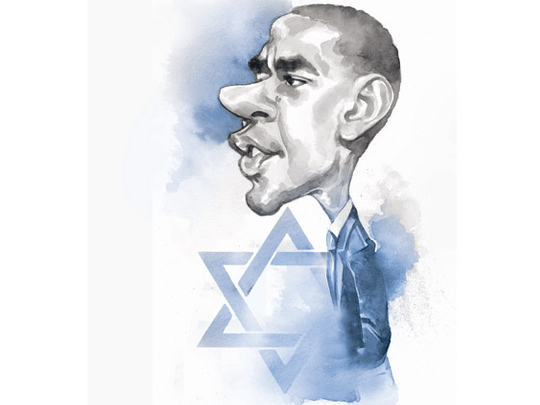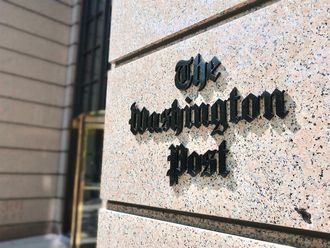
Two senior officials of the Obama administration are doing their utmost to ensure that Israel is fully protected against any potential threat from its regional enemies and that the US-Israeli alliance remains as unshakable as ever.
They are Stuart A. Levey, Under Secretary for Terrorism and Financial Intelligence at the US Department of the Treasury, and Andrew J. Shapiro, Assistant Secretary for Political-Military Affairs in the Department of State.
Are Levey and Shapiro shielding America from attack by angry and frustrated Muslims or are they, on the contrary, feeding the fires of anti-Americanism? Are they helping to persuade Israel to take risks for peace, or are they encouraging hardline Israelis to thumb their noses at the American president?
In other words, are the tireless efforts of these two key officials promoting or obstructing President Barack Obama's declared objectives of resolving the Arab-Israeli conflict and of reaching a negotiated settlement with Iran over its nuclear ambitions?
Levey has for years been leading the push to cripple Iran's economy. His special interest has been to convince — and pressure — banks around the world not to do business with Iran. He wants to cut off Iranian banks from access to the international banking system, and he has achieved some considerable success. Whether it makes Tehran more amenable to reconciliation with Washington or more furiously defiant is another matter.
Defender of the faith
Andrew Shapiro is another passionate American scourge of Israel's enemies. As he explained on July 16 to an audience at Washington's Saban Centre, one of his primary responsibilities at the State Department is to preserve Israel's regional military dominance — that is to say, its ability to counter and defeat any threat from any individual state, coalition of states or non-state actor.
In words which echo those of Israeli officials, Shapiro denounced Iran — "there is no greater strategic threat than the prospect of a nuclear armed Iran"; Syria, which he claimed posed a "significant conventional security challenge" to Israel; and Hezbollah and Hamas "whose rockets indiscriminately target Israel's population centres".
"The unique relationship between the United States and Israel," Shapiro declared, "is rooted in common values, interwoven cultures and mutual interest".
It seems to have escaped Shapiro's notice that recent trends in Israel mark a radical departure from these "common values" — such as the racist and undemocratic policies of Foreign Minister Avigdor Lieberman and his extremist Yisrael Beiteinu party; the ‘loyalty laws' he has promoted; and his proposed conversion bill, which assigns authority over conversion to the Chief Rabbinate, and which, to quote the Israeli daily Haaretz, "threatens to undermine Israel's crucial relationship with Jewish communities in the United States".
Added to all this is the many Greater Israel ideologues in Prime Minister Benjamin Netanyahu's coalition, who are totally opposed to Obama's two-state solution of the Palestine problem; the proposal to strip Haneen Zoabi, an Arab woman member of the Knesset, of her parliamentary privileges for daring to take part in the aid flotilla for Gaza; the rightist assault on Israel's Supreme Court; the continued terrorism of fanatical colonists against helpless Palestinian peasants; the destruction of Palestinian homes and businesses in occupied East Jerusalem in the Mayor's unrelenting bid to ‘Judaise' the city, and so much more.
So far as one knows, these actions do not accord with Obama's values, or with those of liberal American Jews and Israelis, who are evidently more worried than either Levey or Shapiro by the increasingly aggressive and fascistic trends in Israeli society.
His hands are tied
Why does Obama not act? The obvious answer is that he cannot. His mind is focused on the midterm Congressional elections on November 2, when all 435 members of the House of Representatives, and 34 of the 100 senators, will be battling for their seats. Obama's fear is that he could lose his Democratic majority to the Republicans.
In the circumstances, he dare not offend Israel's powerful friends. Hence the much touted activities of Levey and Shapiro to reassure Israel and its supporters that Obama's support for Israel is as ‘unwavering' as that of his predecessor in the White House, George W. Bush.
Will Obama be tougher after the midterm elections? Nothing is less certain. It looks increasingly as if the ‘new beginning' he promised the Arabs and Muslims in his Cairo speech on June 4, 2009, has turned into a mirage.
The Europeans are worried by American impotence to check Israel's continued land grab on the West Bank and in occupied East Jerusalem, or to lift its punishing siege on Gaza. Hence the recent burst of activity by Catherine Ashton, the EU's High Representative for foreign affairs and security.
Although she has supported sanctions against Iran, she has also pushed for renewed talks with Tehran in September on its nuclear programme. Following her visit to Gaza last weekend, she has pressed for the opening of crossings to and from the cruelly impoverished Gaza Strip — under European supervision.
It remains to be seen whether the Europeans are united, resolute and brave enough to confront Washington on these issues, so crucial for regional peace.
Patrick Seale is a commentator and author of several books on Middle East affairs.








